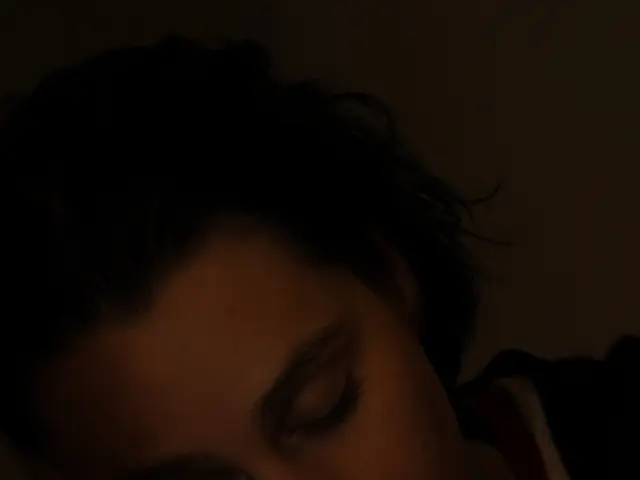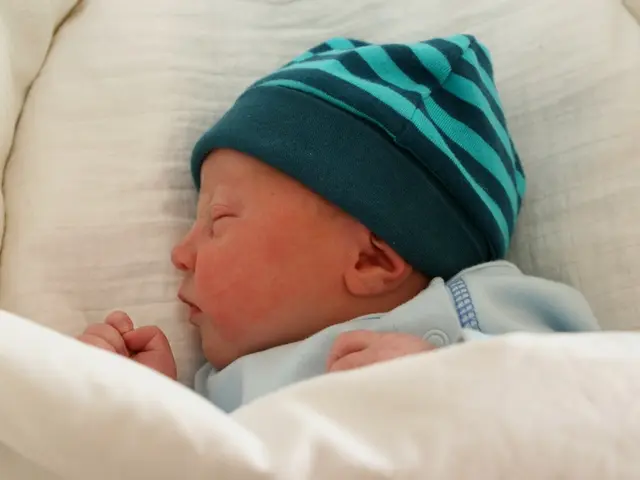Child's Fever Triggers Seizure: 8 Actions to Take + Emergency 9-1-1 Call Situations
Getting a Grip on Febrile Seizures: A Comprehensive Guide for Parents
Nurturing little bundles of joy often comes with its fair share of challenges, from runny noses to earaches. But what about when fever brings on seizures? Many moms and dads may feel unprepared to handle such an unexpected situation. Let's break it down!
Cleveland Clinic, a renowned non-profit academic medical center, tells us that one out of every 20 kiddos with a high temperature experiences a seizure related to fever, usually between the ages of 6 months and 5 years.
A child might convulse or stiffen, lose consciousness for several minutes, then quickly recover. Neurologist Ajay Gupta, MD, emphasizes that these episodes can be scary but are rarely anything to worry about long term. Most febrile seizures occur just once, whether during the same illness or due to future fevers.
However, a small percentage (less than 5%) of children who have febrile seizures will develop epilepsy, a condition characterized by recurring, unprovoked seizures. Epilepsy isn't a specific disease but a tendency towards recurring seizures over time. Possible causes of seizures in children and adolescents include high fever, concussion, drug use, and low blood sugar.
So, when does febrile seizure become a cause for concern and a potential indication of epilepsy? Children who have a family history of epilepsy, neurological disabilities, or developmental delays may be at higher risk. Additionally, prolonged, focal, or multiple febrile seizures during the same illness might signal a higher likelihood of developing epilepsy.
What to Do if Your Child Has a Seizure
Stay calm and observe your child if they experience a seizure.
- Place them on a soft surface, like a bed.
- Ensure they're breathing properly and clear their mouth of saliva or debris.
- If the seizure lasts longer than three to five minutes or the child doesn't fully regain consciousness, call 9-1-1.
- Administer any prescribed medication to stop seizures, if needed.
- Give your child medication, like acetaminophen or ibuprofen, to reduce fever once they've recovered.
Your description of the seizure will help your pediatrician better evaluate the situation. They'll likely perform a physical examination,run some basic tests, and check for potential underlying issues such as meningitis or dehydration.
Remember, febrile seizures are usually harmless. Educate yourself on febrile seizures, and consult your pediatrician for tips on managing your child's fever and reducing the risk of febrile seizures.
When to Worry and Seek Medical Attention
Take swift action if the seizure lasts for five minutes or longer, or if the child exhibits symptoms of extreme lethargy, vomiting, or a stiff neck. Other causes for concern include seizures affecting only one side of the body, a fever of 104 degrees F (40 C) or higher, multiple seizures in one day during the same illness, or a seizure without fever or illness. If you notice any of these symptoms, reach out to your pediatrician.
Children with febrile seizures should undergo neurological evaluation if they have multiple seizures within 24 hours, multiple seizures during a single illness, seizures affecting only one part or side of the body, or developmental delays or an abnormal neurological exam. Early detection and treatment of neurodevelopmental issues can greatly improve outcomes.
In both cases where doctors suspect prolonged febrile seizures (more than five minutes) are likely to recur, they can prescribe medication for parents to administer at home to stop seizures rapidly, potentially avoiding an emergency room visit or hospital admission.
Key Takeaways for Parents
- While febrile seizures are common in children, they are not synonymous with epilepsy.
- Certain genetic epilepsy syndromes, such as GEFS+, have febrile seizures as a feature, indicating a genetic link.
- Some children with febrile seizures are at increased risk of developing epilepsy, especially if seizures are complex or if there is a family history.
- Most children with febrile seizures do not develop epilepsy, and treatment of fever does not reduce the risk of febrile seizures or epilepsy.
- Keep calm, observe your child, and seek medical help when necessary. Educate yourself and work closely with your pediatrician to ensure the best possible care for your child.
- It's essential to understand that febrile seizures are not the same as epilepsy, but they can sometimes be indicative of a genetic link to certain epilepsy syndromes.
- Children with a family history of epilepsy, neurological disabilities, or developmental delays might be at higher risk of developing epilepsy after a febrile seizure.
- Understanding the signs of febrile seizures and when to seek medical help is crucial for parents.
- A child experiencing a seizure should be placed on a soft surface, and their breathing should be checked immediately.
- If the seizure lasts longer than three to five minutes, call 9-1-1 for emergency assistance.
- After recovery, administer medication to reduce fever, such as acetaminophen or ibuprofen.
- Consult your pediatrician for tips on managing your child's fever and reducing the risk of febrile seizures.
- Seek immediate medical attention if the seizure lasts for five minutes or longer, the child exhibits extreme lethargy, vomiting, or a stiff neck.
- Doctors may prescribe medication for parents to administer at home to stop seizures rapidly if prolonged febrile seizures are likely to recur.
- Early detection and treatment of neurodevelopmental issues can improve outcomes for children with febrile seizures.
- Other health and wellness considerations include maintaining a healthy diet and encouraging fitness and exercise for overall health.
- Skin care routine, mental health, and men's health are also essential parts of a comprehensive approach to keeping children healthy.
- Moreover, managing weight and cardiovascular health are vital for preventing chronic diseases like diabetes and heart disease in children.
- Similar to adults, children may also experience various medical conditions, such as respiratory conditions, digestive health issues, eye health problems, hearing problems, and autoimmune disorders.
- In case of neurological disorders like seizures or neurological conditions, therapies and treatments like CBD oil or medicare can help provide necessary support and care for children.








